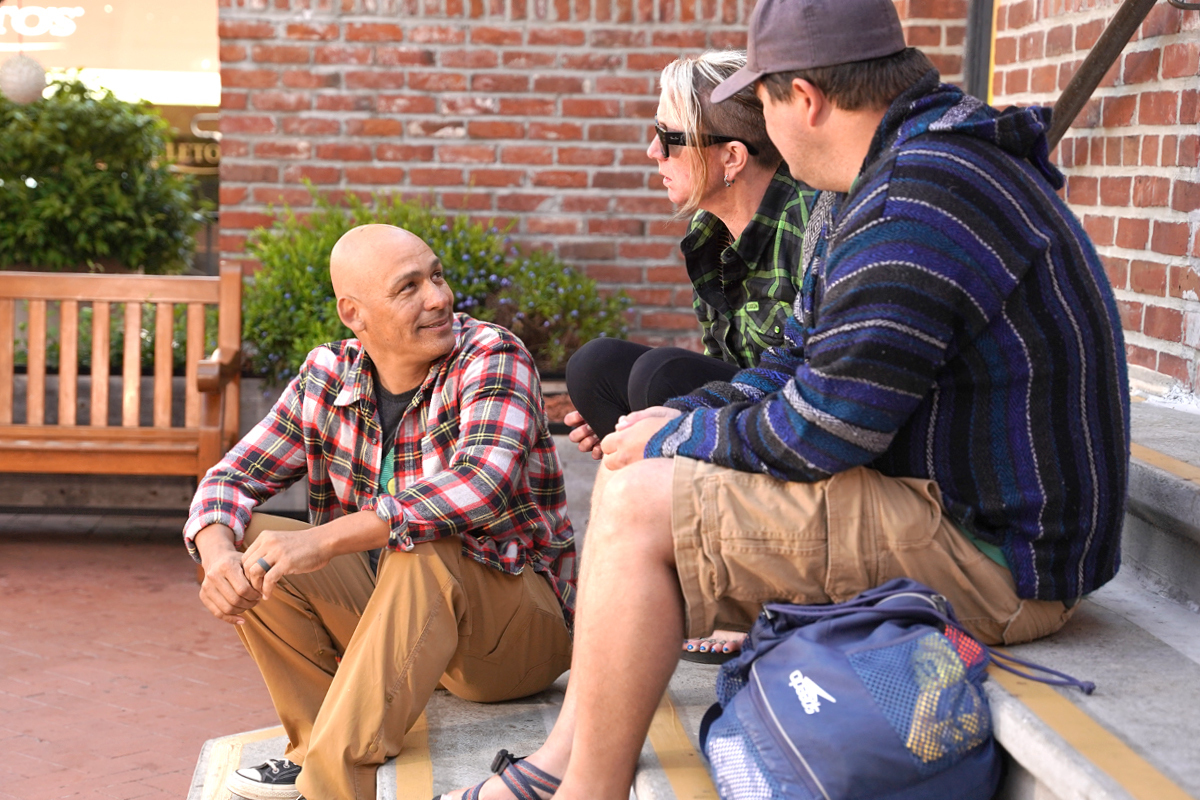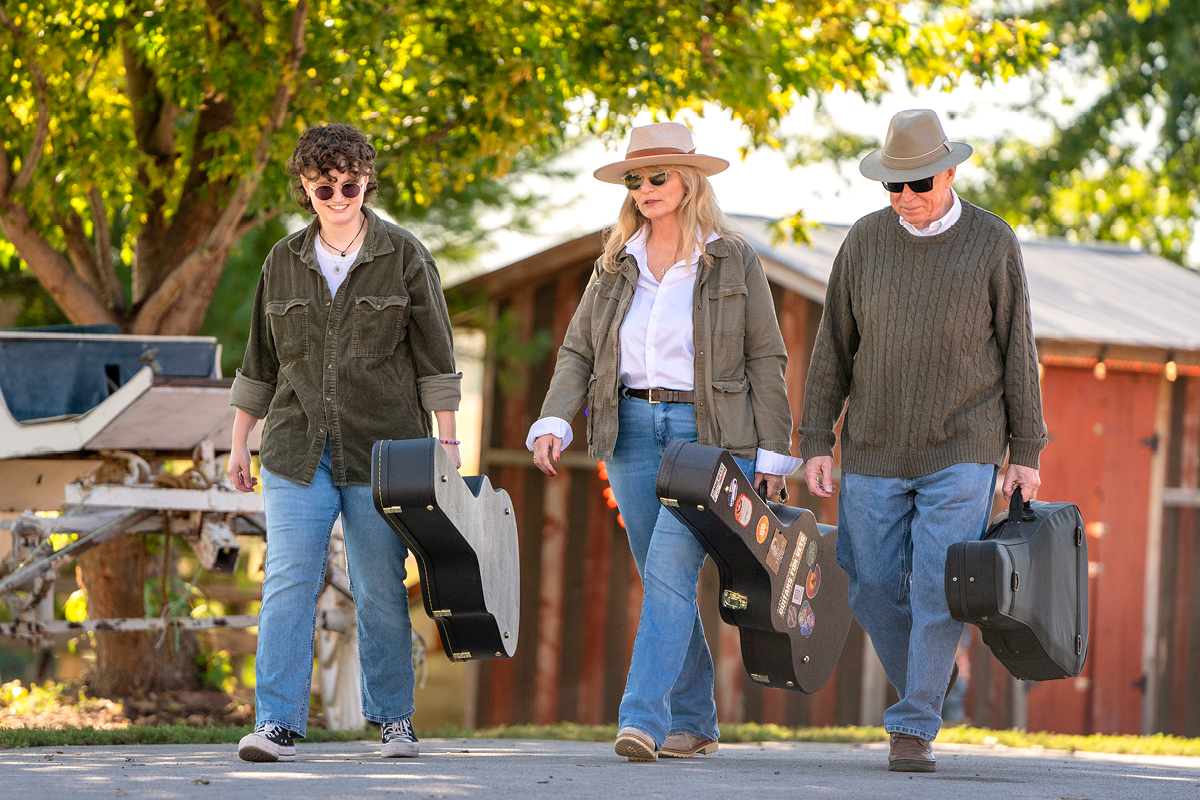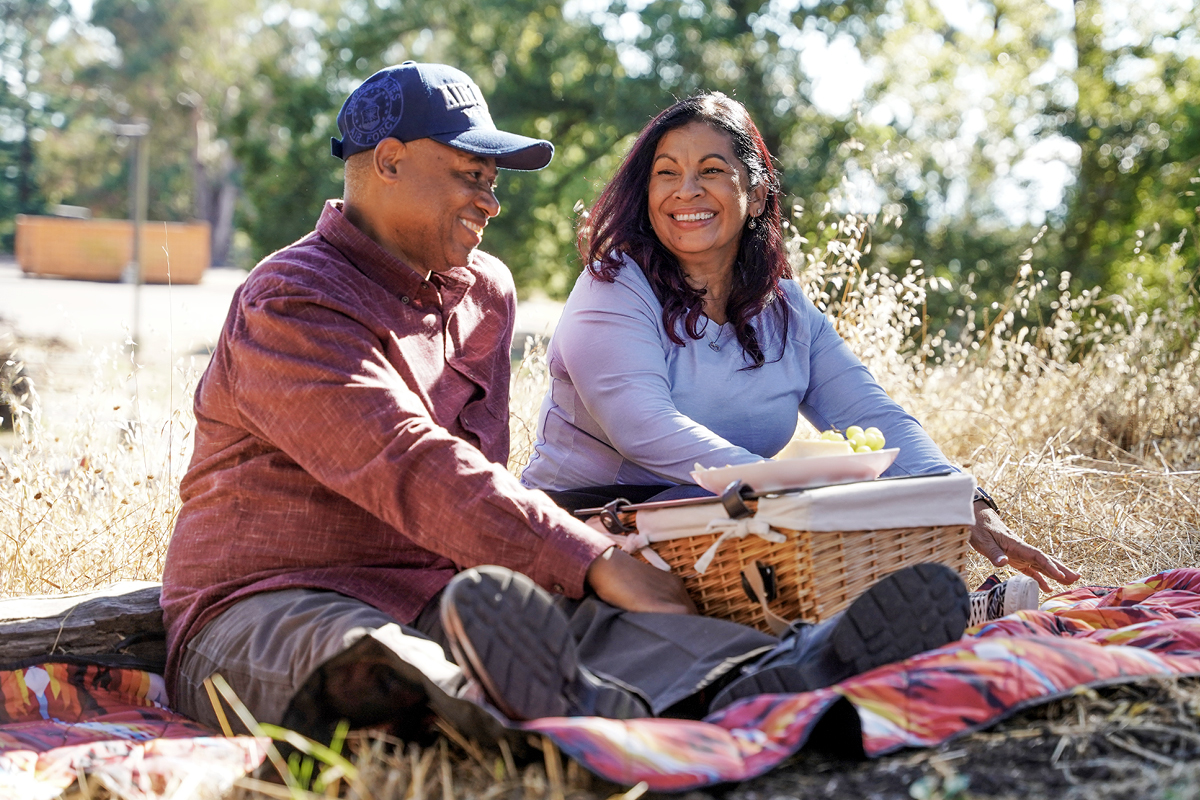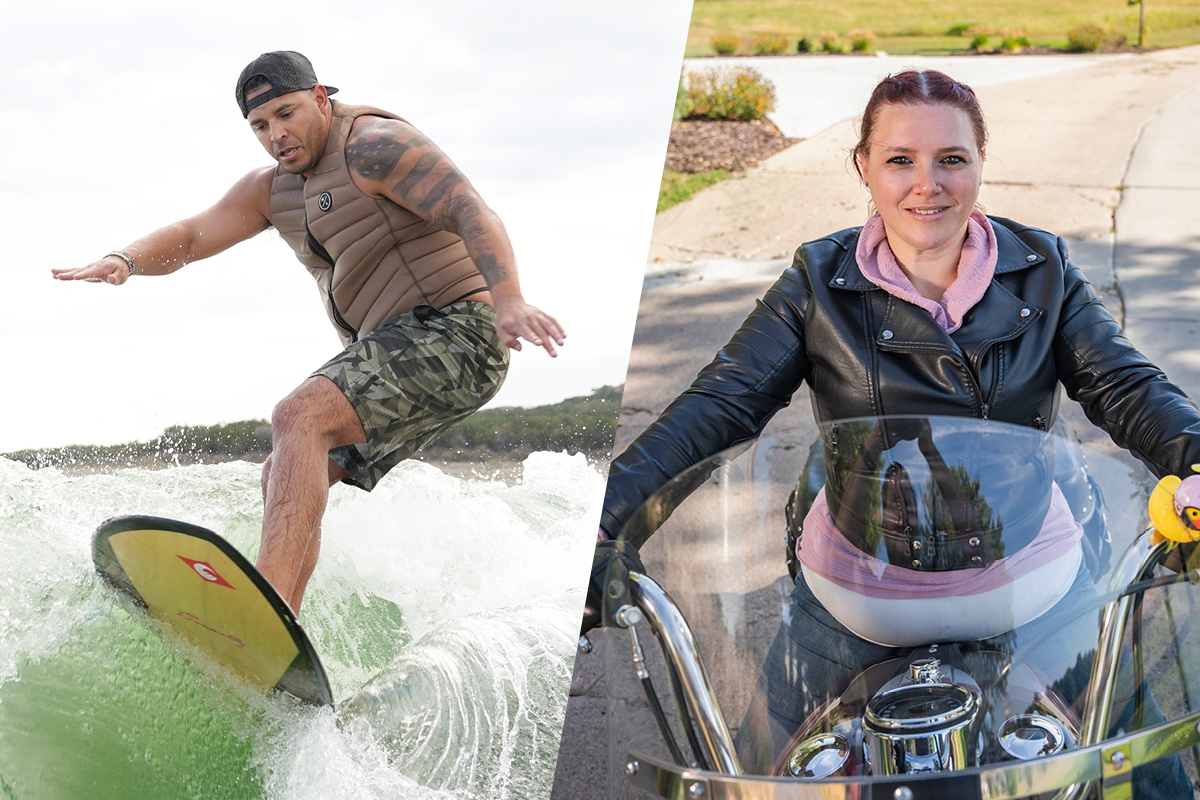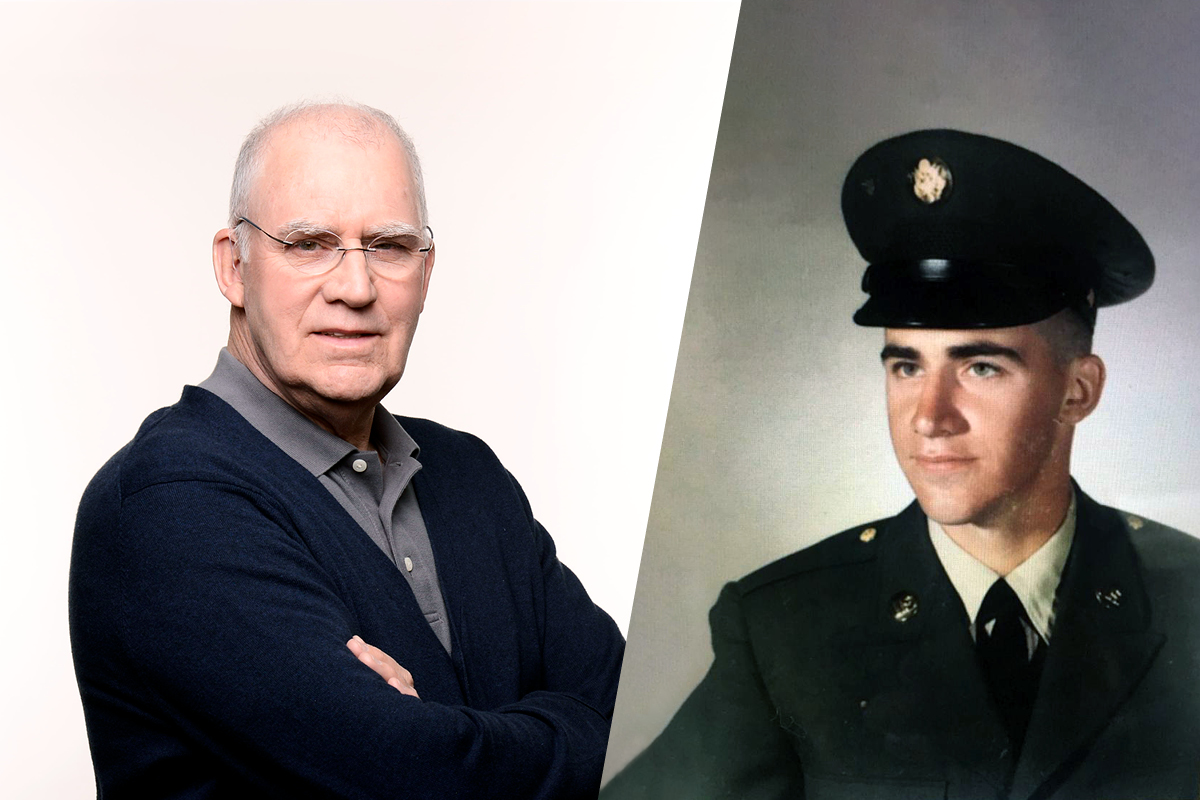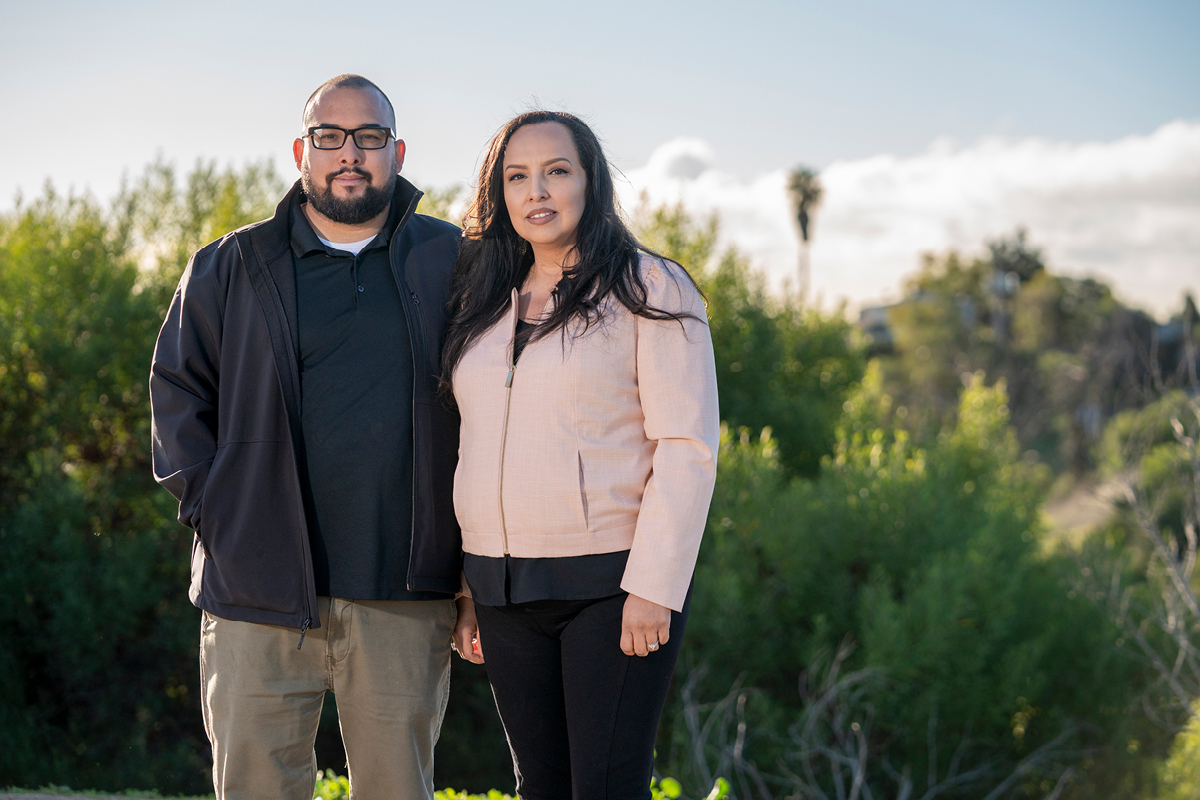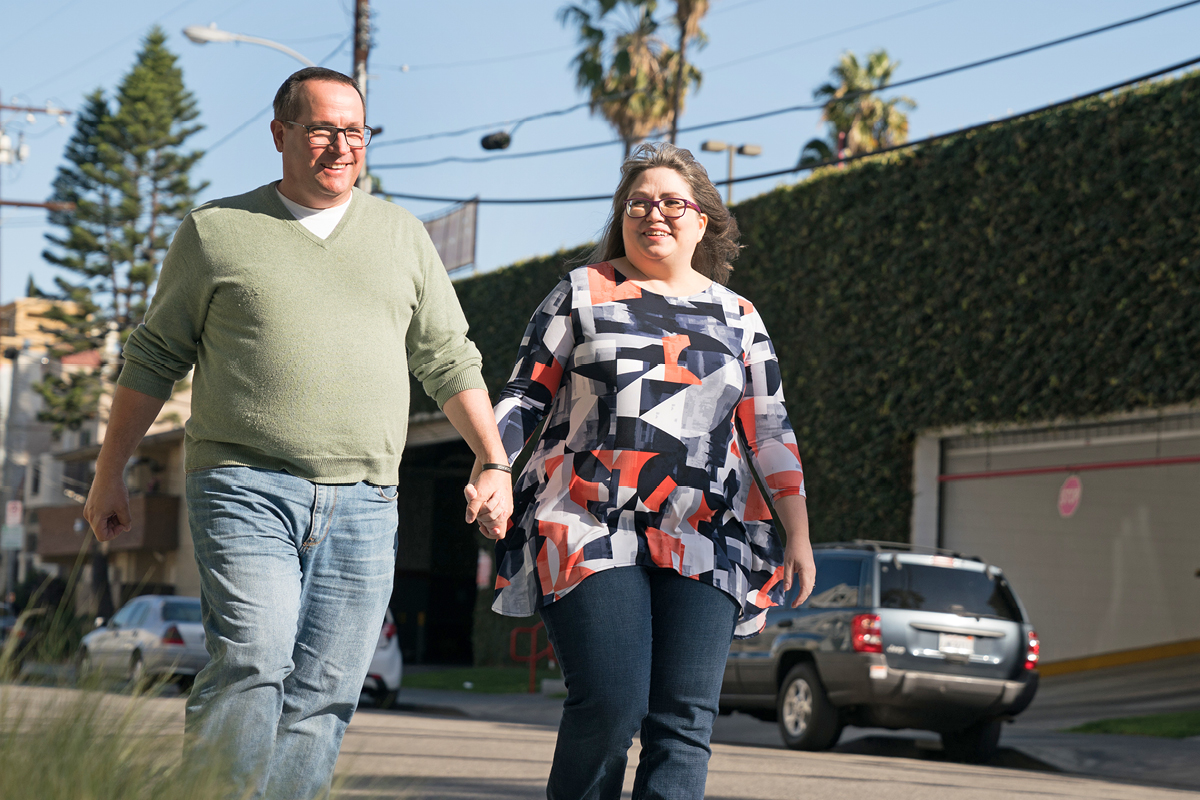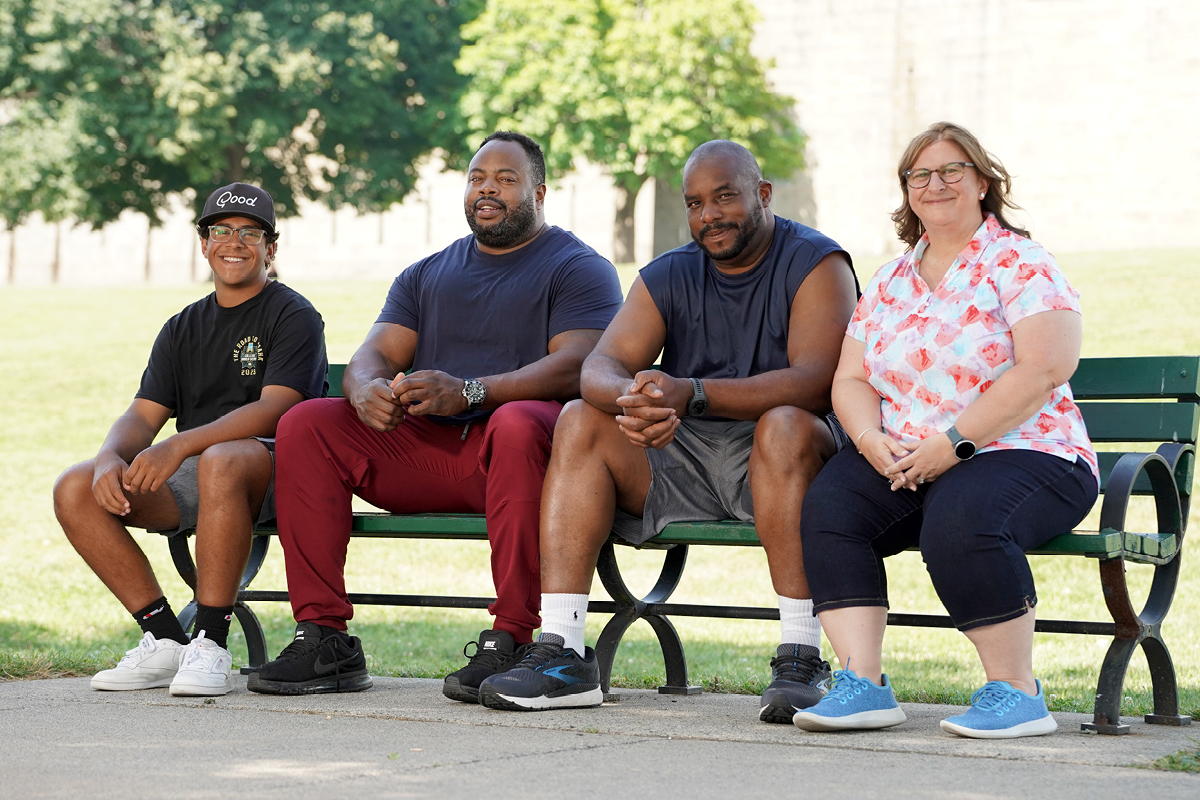“Today’s the Day”
3-minute read
3-minute read
For Veterans facing mental health challenges, group therapy offers connection and mutual support. Several Veterans share what group treatment has meant to them and how it has helped them heal.
4-minute read
Depression, Stress and Anxiety, Problems with Drugs, Physical InjuryTalk therapy, EMDR, and sharing music with other Veterans helped Air Force Veteran Taylor heal from the effects of military sexual trauma and restore harmony in her life.
3-minute read
Military Sexual Trauma, PTSD, Stress and Anxiety, DepressionLearn 5 simple ways to support Veterans facing mental health challenges. Read how family and friends helped these Veterans take the first step to seek therapy and build new lives.
5-minute read
Spread the Word, Transitioning From Service, Family and RelationshipsVeterans Stefan, Jocelyn, and Paul share how new activities and interests enriched their lives and helped them build on the mental health gains they made through therapy.
5-minute read
Transitioning From Service, Family and Relationships, Stress and Anxiety, Military Sexual TraumaA traumatic experience in Vietnam left Bud, an Army Veteran, with PTSD symptoms and a drinking problem. A wake-up call about his drinking led him to get help and rebuild his life.
3-minute read
PTSD, Spirituality, Problems with AlcoholEMDR, CBT, and DBT are important therapies for mental health conditions and challenges. Learn what they are, how they work, and how Veterans have benefited from them.
6-minute read
PTSD, Military Sexual Trauma, Depression, Stress and AnxietyThree Veterans—Michelle, Ryan, and Patrick—share how therapy helped them heal from traumatic brain injury. Treatment helped them understand and manage TBI effects and improve their quality of life.
5-minute read
Traumatic Brain Injury, PTSD, Family and RelationshipsDeployment stresses and, later, an abusive relationship brought Marine Corps Veteran Shifali to a crisis point. Therapy and active use of the skills she learned there helped restore Shifali’s faith in herself.
2-minute read
Feeling on Edge, Military Sexual Trauma, SuicideAfter military service that included a catastrophic helicopter crash on his ship, Arafat experienced PTSD that harmed his relationships and led to unhealthy alcohol use. Therapy and family support helped him start his journey toward healing.
3-minute read
PTSD, Problems with Alcohol, Anger and Irritability, Family and RelationshipsClick here to view the Vulnerability Disclosure Policy.
Hello! Looking for Veteran videos? We can help.
Start by selecting a topic:
Negative Moods or Emotions
Which of these signs or symptoms are you interested in learning more about?
Anger & Irritability
Got it. Here are some videos for you!
Video Title: This Marine Veteran Manages Anger With Distance Running and Coping Techniques
Video Title: Anything's Possible
Video Title: Marine Gets Opportunity To Pick Up His Life After Substance Misuse
What else can we help you with?
If I'm experiencing anger & irritability, what can I do about it right away?
Some anger management strategies include walking away from the situation, maintaining a regular sleep schedule, taking slow, deep breaths, and exercising regularly. You can also talk to your family, friends, or health care provider about your anger and irritability. They may be able to provide support and help you find resources that are right for you. Learn more steps you can take on our Anger and Irritability page.
Is there anything else we can help you with?
Take the next step to connect with care.
New to VA? Apply for health care benefits. Getting started is simple. Create a free account online to help ease your enrollment process. There’s a whole community of support ready to help with whatever you’re going through. Use this tool to find resources near you.
Is there anything else we can help you with?
Show me all videos on Anger & Irritability.
Is there anything else we can help you with?
Feeling on Edge
Got it. Here are some videos for you!
Video Title: “I like who I am now.” Marine Veteran Rediscovers Her Worth Through Therapy
Video Title: Finding ways to deal with feeling on edge
Video Title: Hypervigilance | Signs of a Mental Health Challenge
What else can we help you with?
If I’m feeling on edge, what can I do about it right away?
If you are feeling on edge, breathe deeply. Try grounding yourself by focusing on your surroundings or neutral physical sensations, like the feeling of your feet on the floor. Your family, friends, or health care provider may be able to provide support and help you find treatment that is right for you, so turn to them whenever you are ready. Learn more steps you can take on our Feeling on Edge page.
Is there anything else we can help you with?
Take the next step to connect with care.
New to VA? Apply for health care benefits. Getting started is simple. Create a free account online to help ease your enrollment process. There’s a whole community of support ready to help with whatever you’re going through. Use this tool to find resources near you.
Is there anything else we can help you with?
Show me all videos on Feeling on Edge.
Is there anything else we can help you with?
Feelings of Hopelessness
Got it. Here are some videos for you!
Video Title: I’m not a victim anymore
Video Title: Dealing with feelings of hopelessness in therapy
Video Title: Healing after feeling hopeless
What else can we help you with?
If I’m feeling hopeless or having thoughts of hurting myself, what can I do about it right away?
If you are a Veteran or know a Veteran who is feeling hopeless or having thoughts of suicide, talk to someone right away. Consider sharing what you're feeling and thinking with your family, friends, or health care provider. In addition, you can call the Veterans Crisis Line: Dial 988 and then Press 1, chat online at VeteransCrisisLine.net, or send a text to 838255. The Veterans Crisis Line offers free, confidential support, 24/7. Learn more steps you can take on our Feelings of Hopelessness page.
Is there anything else we can help you with?
Take the next step to connect with care.
New to VA? Apply for health care benefits. Getting started is simple. Create a free account online to help ease your enrollment process. There’s a whole community of support ready to help with whatever you’re going through. Use this tool to find resources near you.
Is there anything else we can help you with?
Show me all videos on Feelings of Hopelessness.
Is there anything else we can help you with?
Guilt
Got it. Here are some videos for you!
Video Title: Finding Your Purpose
Video Title: Compassion and Forgiveness
Video Title: Army Veteran Crafts a Better Life Through Mental Health Treatment
What else can we help you with?
If I'm experiencing guilt, what can I do about it right away?
If you find yourself living with guilt or remorse about a past action or inaction, try to set aside time to think about your feelings. Remember that everyone has things they would have done differently—but no one can change the past or predict the future. Sometimes the experience is worse if you keep your feelings to yourself. Telling someone, like a family member or friend, about your regrets or guilty feelings can be a good first step to overcoming them. Learn more steps you can take on our Guilt page.
Is there anything else we can help you with?
Take the next step to connect with care.
New to VA? Apply for health care benefits. Getting started is simple. Create a free account online to help ease your enrollment process. There’s a whole community of support ready to help with whatever you’re going through. Use this tool to find resources near you.
Is there anything else we can help you with?
Show me all videos on Guilt.
Is there anything else we can help you with?
Loss of Interest or Pleasure
Got it. Here are some videos for you!
Video Title: “I wasn't ready.” Army Veteran Discusses PTSD and Being Open to Healing
Video Title: Her father saw the signs and recommended help
Video Title: Recovering from a father’s death
What else can we help you with?
If I'm experiencing loss of interest or pleasure, what can I do about it right away?
If you are experiencing loss of interest or pleasure, try to plan a pleasurable activity daily, even if it's something small. Physical activity can improve your mood and help you sleep better. Talking to your family, friends, or health care provider about what you're feeling can also be helpful. They may be able to provide support and help you discover what is causing you to lose interest in things you once enjoyed. Learn more steps you can take on our Loss of Interest or Pleasure page.
Is there anything else we can help you with?
Take the next step to connect with care.
New to VA? Apply for health care benefits. Getting started is simple. Create a free account online to help ease your enrollment process. There’s a whole community of support ready to help with whatever you’re going through. Use this tool to find resources near you.
Is there anything else we can help you with?
Show me all videos on Loss of Interest or Pleasure.
Is there anything else we can help you with?
Social Withdrawal & Isolation
Got it. Here are some videos for you!
Video Title: Connecting with others to find a fulfilling life
Video Title: “You just continually heal.” Veteran Shares How Women’s Therapy Groups Helped Her Rebuild Her Life
Video Title: Getting back on track in civilian life
What else can we help you with?
If I’m withdrawing from others or isolating myself, what can I do about it right away?
Allowing social withdrawal or social isolation to continue unchecked will only make your situation more challenging. Consider reaching out to your family members, friends, or health care provider, even though it may be the last thing you feel like doing. Connect with Veterans' groups or participate in clubs or hobbies focused on something you like. Research shows that spending time talking with others improves your mood and has a positive effect on health. Learn more steps you can take on our Social Withdrawal and Isolation page.
Is there anything else we can help you with?
Take the next step to connect with care.
New to VA? Apply for health care benefits. Getting started is simple. Create a free account online to help ease your enrollment process. There’s a whole community of support ready to help with whatever you’re going through. Use this tool to find resources near you.
Is there anything else we can help you with?
Show me all videos on Social Withdrawal & Isolation.
Is there anything else we can help you with?
Stress & Anxiety
Got it. Here are some videos for you!
Video Title: Navigating Life's Transitions
Video Title: Grounded in the Present
Video Title: A New Purpose
What else can we help you with?
What can I do if I’m experiencing stress and anxiety?
If you're experiencing stress and anxiety, try practicing relaxation techniques, such as deep breathing, to help you cope when things upset you or don't go according to plan. In addition, talk to your family, friends, or health care provider about what you're experiencing. They may be able to provide support and help you find solutions. Learn more steps you can take on our Stress and Anxiety page.
Is there anything else we can help you with?
Take the next step to connect with care.
New to VA? Apply for health care benefits. Getting started is simple. Create a free account online to help ease your enrollment process. There’s a whole community of support ready to help with whatever you’re going through. Use this tool to find resources near you.
Is there anything else we can help you with?
Show me all videos on Stress & Anxiety.
Is there anything else we can help you with?
Social or Relationship Challenges
Which of these signs or symptoms are you interested in learning more about?
Relationship Problems
Got it. Here are some videos for you!
Video Title: Veteran on Maintaining Sobriety: “I get better by helping others.”
Video Title: Curtis’ wife was the reason he reached out
Video Title: Coming home was tougher than Jamie expected
What else can we help you with?
If I'm experiencing relationship problems, what can I do about it right away?
Many Veterans have overcome relationship problems that arose after time away from family or after stressful situations. Try making a "communication plan" to express your thoughts and feelings with loved ones by considering what to say and how. Writing down these thoughts can help your family and friends better understand your circumstances and assist you in finding support. Learn more steps you can take on our Relationship Problems page.
Is there anything else we can help you with?
Take the next step to connect with care.
New to VA? Apply for health care benefits. Getting started is simple. Create a free account online to help ease your enrollment process. There’s a whole community of support ready to help with whatever you’re going through. Use this tool to find resources near you.
Is there anything else we can help you with?
Show me all videos on Relationship Problems.
Is there anything else we can help you with?
Physical Symptoms
Which of these signs or symptoms are you interested in learning more about?
Chronic Pain
Got it. Here are some videos for you!
Video Title: Getting Your Life Back
Video Title: About Getting Support, Marine Corps Veteran Says: “It felt good to talk to somebody that listened.”
Video Title: A Hand Up
What else can we help you with?
If I'm experiencing chronic pain, what can I do about it right away?
If you are experiencing chronic pain, there are a few things you can do to improve your well-being: (1) Tell your doctor about it. They can help develop a treatment plan. (2) Find ways to stay physically active, according to your doctor's recommendations. (3) Keep a "pain diary," where you can record your progress with pain and how it affects your life. Learn more steps you can take on our Chronic Pain page.
Is there anything else we can help you with?
Take the next step to connect with care.
New to VA? Apply for health care benefits. Getting started is simple. Create a free account online to help ease your enrollment process. There’s a whole community of support ready to help with whatever you’re going through. Use this tool to find resources near you.
Is there anything else we can help you with?
Show me all videos on Chronic Pain.
Is there anything else we can help you with?
Eating Problems
Got it. Here are some videos for you!
Video Title: Setting Up for Success
Video Title: Learning skills in therapy to manage anxiety
Video Title: Treatment helped after a traumatic brain injury
What else can we help you with?
If I'm experiencing eating problems, what can I do about it right away?
If you are experiencing eating problems, find healthy ways to manage stress, such as taking a walk, going for a run, practicing relaxation exercises like deep breathing or meditation, or doing something nice for yourself like watching a movie or reading. Also, talk to your family, friends, or health care provider about what you're experiencing. They may be able to provide support and help you find solutions. Learn more steps you can take on our Eating Problems page.
Is there anything else we can help you with?
Take the next step to connect with care.
New to VA? Apply for health care benefits. Getting started is simple. Create a free account online to help ease your enrollment process. There’s a whole community of support ready to help with whatever you’re going through. Use this tool to find resources near you.
Is there anything else we can help you with?
Show me all videos on Eating Problems.
Is there anything else we can help you with?
Headaches
Got it. Here are some videos for you!
Video Title: A Veteran’s Journey From Homelessness to Hope
Video Title: Treatment for TBI improved David's life
Video Title: A Veteran reaches out for help with TBI symptoms
What else can we help you with?
If I'm experiencing headaches, what can I do about it right away?
If you are experiencing headaches, try to rest with your eyes closed and head supported. Getting enough sleep, eating regularly without skipping meals, staying hydrated, and maintaining good posture are simple lifestyle changes that can help you avoid or reduce headaches. Talk to your doctor if you experience frequent or recurring headaches, which can be a sign of a medical issue. Learn more steps you can take on our Headaches page.
Is there anything else we can help you with?
Take the next step to connect with care.
New to VA? Apply for health care benefits. Getting started is simple. Create a free account online to help ease your enrollment process. There’s a whole community of support ready to help with whatever you’re going through. Use this tool to find resources near you.
Is there anything else we can help you with?
Show me all videos on Headaches.
Is there anything else we can help you with?
Trouble Sleeping
Got it. Here are some videos for you!
Video Title: “We’re still comrades.” Army Veteran Describes His Systems of Support
Video Title: Vietnam Veterans’ Voices on Managing PTSD
Video Title: Admitting she needed support was the first step
What else can we help you with?
If I’m having trouble sleeping, what can I do about it right away?
There are several ways to improve your sleep right away: (1) Make your bedroom a place just for sleeping—not for activities like watching TV, reading, working, or listening to the radio. (2) Avoid light exposure from screens at night, which can throw off your sleep cycle. (3) Avoid alcohol and large meals near bedtime. (4) Maintain a regular sleep schedule. In addition, talking with your family members, close friends, or a health care provider may help you find support and resources to address your challenges. Learn more steps you can take on our Trouble Sleeping page.
Is there anything else we can help you with?
Take the next step to connect with care.
New to VA? Apply for health care benefits. Getting started is simple. Create a free account online to help ease your enrollment process. There’s a whole community of support ready to help with whatever you’re going through. Use this tool to find resources near you.
Is there anything else we can help you with?
Show me all videos on Trouble Sleeping.
Is there anything else we can help you with?
Cognitive Symptoms
Which of these signs or symptoms are you interested in learning more about?
Confusion
Got it. Here are some videos for you!
Video Title: Sometimes it's more than a physical injury
Video Title: Steps to overcome panic attacks
Video Title: Everything seems like a potential threat
What else can we help you with?
If I'm experiencing confusion, what can I do about it right away?
If you are experiencing confusion, try to slow down and focus on the task at hand. Take regular breaks to avoid feeling tired and overwhelmed. Avoid drinking alcohol, which can make confusion worse. Talk to your health care provider to determine whether a medical condition such as TBI might be contributing to the problem. You can also talk to a pharmacist about the possible effects of medications you're taking. Learn more steps you can take on our Confusion page.
Is there anything else we can help you with?
Take the next step to connect with care.
New to VA? Apply for health care benefits. Getting started is simple. Create a free account online to help ease your enrollment process. There’s a whole community of support ready to help with whatever you’re going through. Use this tool to find resources near you.
Is there anything else we can help you with?
Show me all videos on Confusion.
Is there anything else we can help you with?
Difficulty Concentrating
Got it. Here are some videos for you!
Video Title: My life has gotten so much more livable
Video Title: Solutions for difficulty concentrating
Video Title: Taking steps to improve memory helped her husband
What else can we help you with?
If I'm experiencing difficulty concentrating, what can I do about it right away?
If you are experiencing difficulty concentrating, avoid distractions like loud music or the television. Develop a routine and try to stick to a regular schedule. Additionally, take regular breaks to prevent feeling tired. Talk to your health care provider to determine whether a condition such as TBI, ADHD, or anxiety might be contributing to the problem. You can also talk to a pharmacist about the possible effects of medications you're taking. Learn more steps you can take on our Difficulty Concentrating page.
Is there anything else we can help you with?
Take the next step to connect with care.
New to VA? Apply for health care benefits. Getting started is simple. Create a free account online to help ease your enrollment process. There’s a whole community of support ready to help with whatever you’re going through. Use this tool to find resources near you.
Is there anything else we can help you with?
Show me all videos on Difficulty Concentrating.
Is there anything else we can help you with?
Dizziness
Got it. Here are some videos for you!
Video Title: I don't know what would've happened without VA
Video Title: Coping with TBI to improve quality of life
Video Title: Army Veteran learns to manage TBI symptoms
What else can we help you with?
If I'm experiencing dizziness, what can I do about it right away?
If you are experiencing dizziness, lie down for a few minutes with your head slightly elevated. Lifestyle changes such as drinking more water, getting enough rest, and avoiding alcohol or drugs can help. Medications and medical conditions such as heart disease or ear issues can also cause dizziness; consult a medical provider if you get dizzy on a regular basis. If you suddenly lose function in part of your body (e.g., arm weakness, face drooping, difficulty speaking) along with experiencing vertigo, this can indicate a serious problem, such as a stroke. Call 911 and seek medical help immediately. Learn more steps you can take on our Dizziness page.
Is there anything else we can help you with?
Take the next step to connect with care.
New to VA? Apply for health care benefits. Getting started is simple. Create a free account online to help ease your enrollment process. There’s a whole community of support ready to help with whatever you’re going through. Use this tool to find resources near you.
Is there anything else we can help you with?
Show me all videos on Dizziness.
Is there anything else we can help you with?
Flashbacks
Got it. Here are some videos for you!
Video Title: Triggers | Signs of a Mental Health Challenge
Video Title: Ending the grip of nightmares and flashbacks
Video Title: A science class causes a flashback for Tim
What else can we help you with?
If I’m experiencing a flashback, what can I do about it right away?
A flashback can be distressing for you and those around you. Try grounding yourself by focusing on details of your surroundings or neutral physical sensations, such as the feeling of your feet on the floor. Call someone you trust and tell them what is happening. Your family, friends, or health care provider may be able to provide support and help you deal with your flashbacks. Learn more steps you can take on our Flashbacks page.
Is there anything else we can help you with?
Take the next step to connect with care.
New to VA? Apply for health care benefits. Getting started is simple. Create a free account online to help ease your enrollment process. There’s a whole community of support ready to help with whatever you’re going through. Use this tool to find resources near you.
Is there anything else we can help you with?
Show me all videos on Flashbacks.
Is there anything else we can help you with?
Noise or Light Irritation
Got it. Here are some videos for you!
Video Title: I believe we're all in this together
Video Title: Counseling for PTSD leads to a work-study program
Video Title: Army Veteran Encourages Others To “Be Vulnerable” in Order To Heal
What else can we help you with?
If I'm experiencing noise or light irritation, what can I do about it right away?
Learn what triggers episodes of noise or light irritation. Try making adjustments to computer and TV screens, and ensure you get the right amount of sleep. If you're taking medication and want to know if it could be affecting your sensitivity to noise or light, talk to your doctor. Certain drugs or medications may cause vision or hearing problems. Never stop taking a prescription without first consulting a medical professional. Learn more steps you can take on our Noise or Light Irritation page.
Is there anything else we can help you with?
Take the next step to connect with care.
New to VA? Apply for health care benefits. Getting started is simple. Create a free account online to help ease your enrollment process. There’s a whole community of support ready to help with whatever you’re going through. Use this tool to find resources near you.
Is there anything else we can help you with?
Show me all videos on Noise or Light Irritation.
Is there anything else we can help you with?
Nightmares
Got it. Here are some videos for you!
Video Title: Recovering from flashbacks and nightmares
Video Title: Nightmares | Signs of a Mental Health Challenge
Video Title: The first thing I noticed was nightmares
What else can we help you with?
If I’m having nightmares, what can I do about it right away?
To manage upsetting feelings after a nightmare, focus on what's real by touching and describing objects around you. If you're unable to sleep within 15 minutes, leave your bed briefly to wash your hands or drink water while avoiding any strenuous activity. Also, talk to your family, friends, or health care provider about what you're experiencing. They may be able to provide support and help you find solutions. Learn more steps you can take on our Nightmares page.
Is there anything else we can help you with?
Take the next step to connect with care.
New to VA? Apply for health care benefits. Getting started is simple. Create a free account online to help ease your enrollment process. There’s a whole community of support ready to help with whatever you’re going through. Use this tool to find resources near you.
Is there anything else we can help you with?
Show me all videos on Nightmares.
Is there anything else we can help you with?
High-Risk Activities
Which of these signs or symptoms are you interested in learning more about?
Alcohol or Drug Misuse
Got it. Here are some videos for you!
Video Title: After Challenges With Gambling and Substance Use, Veteran Finds Tools To Recover
Video Title: Anything's Possible
Video Title: “We’re stronger together.” Army Veteran Urges Women Veterans To Get Support
What else can we help you with?
What can I do about drinking or drug use?
There are many options for Veterans who want to cut down on or stop drinking alcohol or using drugs. One option is counseling, either one-on-one or in a group. Another involves medication to help reduce use. A third option is mutual-help groups. You can work with your doctor or counselor and try different types of treatment to find the one that's best for you. Learn more steps you can take on our Alcohol or Drug Misuse page.
Is there anything else we can help you with?
Take the next step to connect with care.
New to VA? Apply for health care benefits. Getting started is simple. Create a free account online to help ease your enrollment process. There’s a whole community of support ready to help with whatever you’re going through. Use this tool to find resources near you.
Is there anything else we can help you with?
Show me all videos on Alcohol or Drug Misuse.
Is there anything else we can help you with?
Gambling
Got it. Here are some videos for you!
Video Title: After Challenges With Gambling and Substance Use, Veteran Finds Tools To Recover
Video Title: Brenda found the support she needed to live well
Video Title: Gambling for the adrenaline rush
What else can we help you with?
If I’m experiencing a gambling problem, what can I do about it right away?
The first step in addressing your challenges is to acknowledge that gambling has become a problem in your life and recognize that it is possible to make a change. Practice relaxation exercises such as deep breathing to manage stress and urges to gamble. Spend time with supportive people who do not gamble, and talk with your family, friends, or health care provider about what you're experiencing. They may be able to provide support and help you find solutions that are right for you. Learn more steps you can take on our Gambling page.
Is there anything else we can help you with?
Take the next step to connect with care.
New to VA? Apply for health care benefits. Getting started is simple. Create a free account online to help ease your enrollment process. There’s a whole community of support ready to help with whatever you’re going through. Use this tool to find resources near you.
Is there anything else we can help you with?
Show me all videos on Gambling.
Is there anything else we can help you with?
Reckless Behavior
Got it. Here are some videos for you!
Video Title: “Each day was a new opportunity.” Veteran Reflects on Sobriety Journey
Video Title: I was carrying a heavy load
Video Title: Veteran strength to reach recovery
What else can we help you with?
What can I do if I’ve noticed myself engaging in reckless behavior?
There are ways to prevent yourself from engaging in risky behavior. Plan to avoid situations that might lead to recklessness. For example, leave early or late to avoid rush-hour traffic, or arrange a ride home if you'll be drinking. Talking with your family members, close friends, or a health care provider may help you find support and resources to address your challenges. Learn more steps you can take on our Reckless Behavior page.
Is there anything else we can help you with?
Take the next step to connect with care.
New to VA? Apply for health care benefits. Getting started is simple. Create a free account online to help ease your enrollment process. There’s a whole community of support ready to help with whatever you’re going through. Use this tool to find resources near you.
Is there anything else we can help you with?
Show me all videos on Reckless Behavior.
Is there anything else we can help you with?
